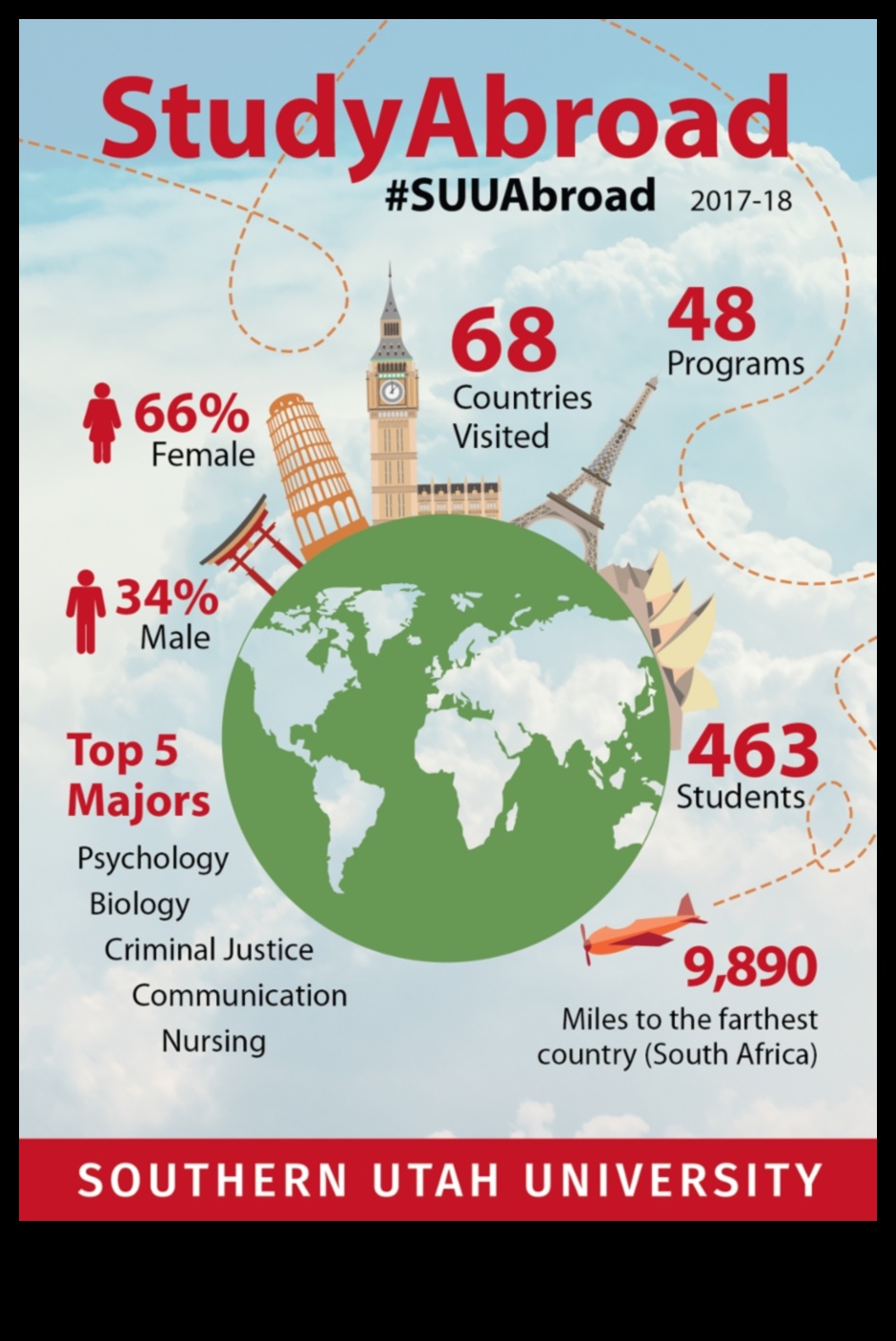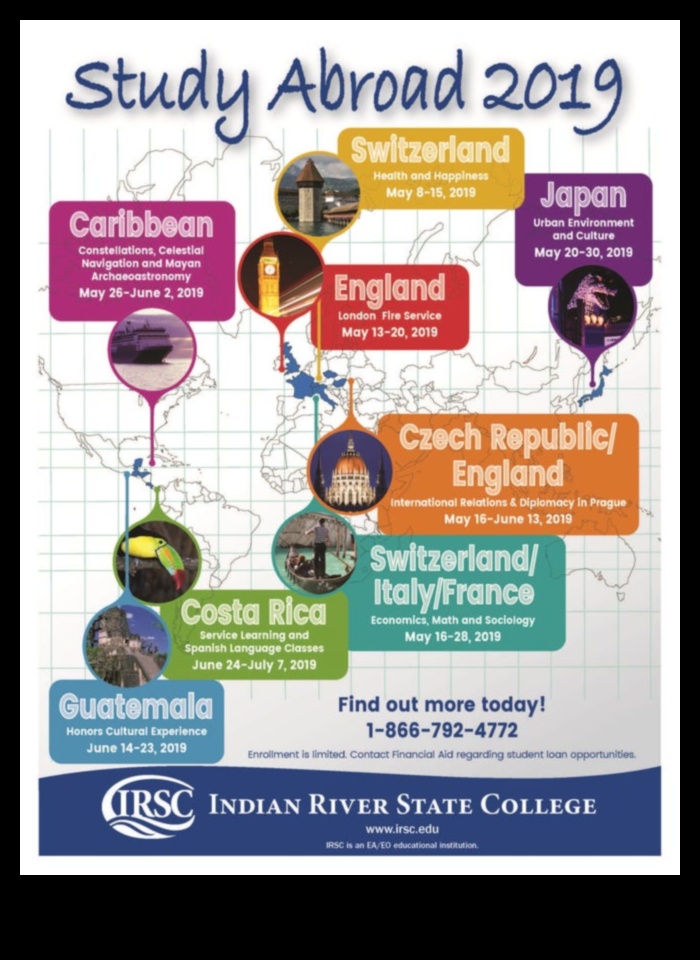
Study abroad is a term used to describe the process of studying in a country other than your own. It can be done for a variety of reasons, such as to improve your language skills, learn about a new culture, or experience a different way of life.
There are many different types of study abroad programs available, from short-term summer programs to full-year academic programs. You can choose to study at a university, college, high school, or language school.
The cost of studying abroad can vary depending on the program you choose, the length of your stay, and the country you are studying in. However, there are many financial aid options available to help you cover the cost of your study abroad experience.
Applying to study abroad can be a competitive process, but there are a number of things you can do to increase your chances of being accepted. These include writing a strong personal statement, getting good grades, and having a strong academic record.
Getting ready to study abroad can be an exciting but also stressful experience. There are a number of things you need to do to prepare for your trip, such as getting your visa, arranging your travel, and finding a place to live.
Arriving and settling in to a new country can be challenging, but it is also an incredibly rewarding experience. There are a number of things you can do to make the transition easier, such as learning the local language, getting involved in the community, and making friends with locals.
Studying and living abroad can be a life-changing experience. You will learn about a new culture, make new friends, and develop new skills. You will also gain a greater understanding of the world and your place in it.
If you are considering studying abroad, I encourage you to do your research and find a program that is right for you. It is an experience that you will never forget.
| Topic | Answer |
|---|---|
| Study Abroad | Studying abroad is the process of temporarily living and studying in a country other than your own. |
| International Education | International education is the process of educating students from different countries together. |
| Study Overseas | Studying overseas is the process of studying in a country other than your own. |
| Foreign Exchange | Foreign exchange is the process of exchanging one currency for another. |
| Cultural Exchange | Cultural exchange is the process of learning about and experiencing a different culture. |

2. Benefits of studying abroad
Studying abroad can offer a number of benefits, including:
- The opportunity to learn about a new culture and language
- The chance to meet new people from all over the world
- The opportunity to gain new skills and perspectives
- The chance to improve your academic record
- The opportunity to have a more global perspective on the world
3. How to choose a study abroad program
There are many factors to consider when choosing a study abroad program. The most important factors to consider include:
- Your academic interests
- Your budget
- Your travel preferences
- Your desired length of stay
- Your visa requirements
Once you have considered these factors, you can start narrowing down your options. There are a number of resources available to help you find a study abroad program that is right for you. You can search online, contact your academic advisor, or talk to your friends or family who have studied abroad.
When you are researching programs, be sure to ask about the following:
- The program’s curriculum
- The program’s housing options
- The program’s support services
- The program’s academic reputation
- The program’s cost
Choosing a study abroad program is an important decision. By taking the time to research your options, you can find a program that is right for you and that will help you achieve your academic and personal goals.

4. Financing your study abroad experience
Financing your study abroad experience can be a challenge, but there are a number of resources available to help you make it happen.
Some of the most common ways to finance a study abroad experience include:
- Scholarships and grants
- Student loans
- Personal savings
- Work-study programs
- Part-time jobs
It’s important to start planning your finances early, as it can take some time to gather the necessary funds. You should also be aware of the different costs associated with studying abroad, such as tuition, housing, food, and travel.
If you’re struggling to finance your study abroad experience, there are a number of resources available to help you. Your school’s international student office or study abroad office should be able to provide you with information on scholarships and grants, as well as other financial aid options. You can also search online for scholarships and grants that are specifically designed for study abroad students.
If you’re unable to secure enough financial aid to cover the cost of your study abroad experience, you may need to consider taking out a student loan. However, it’s important to remember that student loans must be repaid, so you should only borrow what you need and make sure that you can afford the monthly payments.
If you have some savings, you can use those funds to help cover the cost of your study abroad experience. However, you should be aware that you may need to dip into your savings for other expenses, such as living expenses or travel costs.
If you’re able to find a work-study program or part-time job, you can use your earnings to help cover the cost of your study abroad experience. However, you should keep in mind that you may not be able to work enough hours to cover all of your expenses.
Financing your study abroad experience can be a challenge, but it’s definitely possible to make it happen. By planning ahead and taking advantage of the available resources, you can make your study abroad dream a reality.

5. Applying to study abroad
Applying to study abroad can be a daunting process, but it is also an exciting one. There are many different factors to consider when applying for a study abroad program, including the program’s location, duration, and cost. It is important to do your research and find a program that is a good fit for your academic and personal goals.
The application process for study abroad programs can vary depending on the program. However, there are some general steps that you can follow to apply for a study abroad program.
- Identify your interests and goals. What do you want to achieve by studying abroad? What are your academic and personal goals?
- Research study abroad programs. There are many different study abroad programs available, so it is important to do your research and find a program that is a good fit for your interests and goals.
- Contact the program coordinator. Once you have found a program that you are interested in, contact the program coordinator to learn more about the program and the application process.
- Complete the application. Each program will have its own application process, so be sure to read the instructions carefully and submit all required materials on time.
- Interview with the program coordinator. Some programs may require you to interview with the program coordinator before being accepted into the program.
- Receive your acceptance letter. If you are accepted into the program, you will receive an acceptance letter from the program coordinator.
Once you have been accepted into a study abroad program, you will need to start preparing for your trip. This includes getting your passport and visa, arranging your travel, and finding housing. It is also important to start thinking about your studies and how you will adjust to living in a new country.
Studying abroad can be an amazing experience that will help you to grow as a student and as a person. By following these steps, you can make the application process as smooth as possible and get ready for an unforgettable experience.
6. Getting ready to study abroad
Getting ready to study abroad can be an exciting but also daunting experience. There are a lot of things to think about and prepare for, but by breaking the process down into smaller steps, it can be much more manageable.
Here are a few things to keep in mind as you start getting ready to study abroad:
-
Choose a program that is right for you. There are many different types of study abroad programs available, so it’s important to do your research and find one that fits your interests and needs.
-
Start planning your budget. Studying abroad can be expensive, so it’s important to start planning your budget early on. Make sure to factor in the cost of tuition, housing, food, transportation, and other expenses.
-
Get your paperwork in order. You will need to apply for a visa, get your passport, and arrange for health insurance.
-
Start packing. You will need to pack for a variety of climates and activities. Make sure to pack light and only bring essential items.
-
Prepare yourself mentally and emotionally. Studying abroad can be a challenging experience, but it can also be an incredibly rewarding one. It’s important to be prepared for both the good and the bad.
By following these tips, you can make the process of getting ready to study abroad a little bit easier.
7. Arriving and settling in
Arriving in a new country and starting a new life can be both exciting and daunting. Here are a few tips to help you settle in and make the most of your study abroad experience:
- Be open to new experiences.
- Don’t be afraid to ask for help.
- Get involved in your new community.
- Make friends with both locals and other international students.
- Learn about the local culture.
- Be patient with yourself.
- Enjoy the experience!
Arriving and settling in can be a challenging experience, but it is also an opportunity to grow and learn. By following these tips, you can make the most of your study abroad experience and create memories that will last a lifetime.
Studying and living abroad
Studying and living abroad can be an incredibly rewarding experience. It can provide you with the opportunity to learn about a new culture, improve your language skills, and meet new people from all over the world. However, it can also be challenging. You may experience homesickness, culture shock, or financial difficulties. It is important to be prepared for these challenges and to have a support system in place.
Here are some tips for studying and living abroad:
- Do your research. Learn as much as you can about the country you will be living in, including the culture, language, and customs.
- Learn the language. Even if you are not fluent, learning some basic phrases will help you get around and communicate with locals.
- Be open to new experiences. Embrace the opportunity to learn about a new culture and meet new people.
- Be prepared for challenges. Homesickness, culture shock, and financial difficulties are all common challenges that students face when studying abroad. It is important to be prepared for these challenges and to have a support system in place.
- Have fun! Studying abroad is a once-in-a-lifetime opportunity. Make the most of it by exploring your new surroundings, meeting new people, and learning about a new culture.
9. Returning home
Returning home after a study abroad experience can be a challenging experience. You may be adjusting to a new culture, new friends, and new expectations. It is important to take some time to process your experience and to make plans for your future. Here are some tips for returning home after a study abroad experience:
Take some time to relax and reflect. After being immersed in a new culture for an extended period of time, it is important to take some time to relax and reflect on your experience. This will help you to process your emotions and to make sense of what you have learned.
Stay in touch with your new friends. One of the best ways to maintain the connections you made while studying abroad is to stay in touch with your new friends. This can be done through social media, email, or phone calls.
Make plans for your future. Once you have had some time to relax and reflect, it is important to start making plans for your future. This may involve returning to school, finding a job, or starting your own business.
Seek professional help if needed. If you are struggling to adjust to your new life back home, it is important to seek professional help. A therapist can help you to process your emotions and to develop coping mechanisms.
Returning home after a study abroad experience can be a challenging experience, but it is also an opportunity to grow and to learn. By taking some time to relax and reflect, staying in touch with your new friends, and making plans for your future, you can make the most of your study abroad experience.
10. FAQ
Here are three common questions about studying abroad and their answers:
Question 1: What is the difference between studying abroad and international education?
Answer: Studying abroad is a type of international education that involves students spending a period of time studying in a country other than their own. International education can also refer to students taking courses online or through distance learning programs that are offered by universities or colleges in other countries.
Question 2: What are the benefits of studying abroad?
Answer: There are many benefits to studying abroad, including:
- Gaining a new perspective on the world
- Learning about different cultures
- Improving your language skills
- Developing new skills and abilities
- Meeting new people and making new friends
Question 3: How much does it cost to study abroad?
Answer: The cost of studying abroad can vary depending on the country you choose to study in, the length of your program, and the type of accommodation you choose. However, you can expect to pay anywhere from $5,000 to $20,000 per semester.